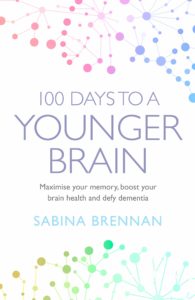Do you worry getting dementia? Involved about your reminiscence? Globally-renowned neuroscientist, Dr Sabina Brennan brings you the preventative measures that work
The mind in all its glory, is essentially the most treasured and vital organ in our whole physique. But it’s astonishing how we neglect this powerhouse, with little thought to its maintenance in our healthcare regimes.
Because the world’s inhabitants will increase, the variety of older adults with dementia is predicted to extend to 132 million by 2050, says neuroscientist Dr Sabina Brennan in her new ebook, 100 Days to a Youthful Mind.
With no present remedy for dementia, way of life elements can play a key position. Listed here are six methods to assist cut back your danger of getting dementia and beat the statistics that Dr Brennan recommends in her ebook.
Dementia prevention #1 Sleep and get up on the identical time every day
Sleep is significant for mind well being, but it’s surprising how few of us get our really useful hours of sleep (which is 7 to eight hours). Just one in three of us are getting ample sleep, making the World Well being Group declare sleep loss an official epidemic.
It’s vital to go to mattress and stand up on the identical time every day says Brennan.
Sleep acts as a detox for our mind and our physique because it clears out neural waste merchandise that construct up in our central nervous programs all through the day.
With out a good night time’s sleep, our brains don’t have time to flush away these toxins and the build-up stays. Particularly, the nasty sticky protein, beta-amyloid builds up, which is the first reason for Alzheimer’s illness and dementia.
The build-up of beta-amyloid causes plaques to kind in between nerves cells within the mind – just like the plaque build-up you may get in between your tooth. This build-up blocks essential mind signalling between synapses (these are the gaps between nerve cells within the mind that transmit indicators – virtually like the phone strains in your mind), triggering irritation and inflicting extreme mind harm.
 Sleep is significant for good mind well being because it flushes out all of the nasty gunk that builds up in your physique in the course of the day.
Sleep is significant for good mind well being because it flushes out all of the nasty gunk that builds up in your physique in the course of the day.
This then makes it troublesome to your mind to perform properly and it slowly turns into disorientated rising your danger of dementia.
The best way to cherish your sleep and stop the rise of dementia
It’s vital to go to mattress and stand up on the identical time every day, says Brennan.
It sounds easy however how many people do it? You may hold the routine up for one or two days, after which earlier than you realize it, you’re asleep on the couch at 7pm.
However analysis has proven that getting each fast eye motion (REM) and non-REM sleep (see beneath) is crucial for mind health- which is what occurs in case you have a daily sleep and get up sample.
Older adults who’ve dementia have decrease ranges of non-REM sleep and their brains have lowered studying capability
However first…what’s REM and non-REM sleep?
Your sleep is categorised in 5 levels relying on whether or not fast eye motion (REM) happens or not. Non-REM sleep is ‘characterised by gradual brainwaves interspersed with a burst of exercise referred to as spindles’, says Brennan. Most of your sleep within the first half of the night time is non-REM and your deepest sleep is in non-REM sleep levels 3 and 4. The second half of the night time, whenever you dream, is whenever you expertise REM sleep the place {the electrical} exercise recorded throughout this stage is similar to that of a mind that’s ‘awake’.
So, in addition to getting your really useful hours of sleep, you additionally must ensure you are getting sufficient of each forms of sleep. It has been proven that older adults who’ve dementia and have decrease ranges of non-REM sleep, even have lowered studying capability.
If you will mattress after midnight and never getting your really useful hours of sleep, you’re depriving your mind of the time it has to hold out vital actions of each non-REM and REM sleep.
 Hold a set time to get up and sleep at every day so you may get each REM (fast eye motion) and non-REM sleep.
Hold a set time to get up and sleep at every day so you may get each REM (fast eye motion) and non-REM sleep.
With only one night time of sleep deprivation, the expansion of latest neurons in your mind is impaired and there may be weakened studying and encoding-related exercise throughout the hippocampus, which is the a part of your mind that briefly shops new recollections. So it is very important get a balanced quantity of each non-REM and REM sleep by choosing a daily time to sleep and get up every day.
Dementia prevention #2 Don’t be careworn, be excited
Feeling forgetful? Misplaced your sense of humour? Unhealthy consuming habits? These are a number of widespread indicators of stress that may sadly construct up and improve your danger of dementia.
However how will you handle your stress and get your mind mojo again?
Firstly, the stress may not be all dangerous. Brennan focuses on the constructive elements of stress and the way you want an optimum quantity. ‘The whole absence of stress is related to boredom and disengagement, neither of which is sweet to your mind well being or certainly your psychological well being’, she asserts.
Scientific analysis suggests participating in a mentally difficult job will help shield your mind in opposition to the harm brought on by stress
Experiencing continual, ongoing stress that doesn’t let up – and the poor administration of it – is what can initially have an effect on your mind’s behaviour together with your potential to be taught and keep in mind. If stress hormones are constantly being launched and left unchecked, your coronary heart price turns into irregular, blood strain is elevated and your arteries start to harden. This could then result in a discount in mind quantity and improve your danger of growing dementia, Brennan explains.
A method of managing stress is to, plainly put it, be excited advises Brennan.
At what, you ask?
Be excited on the small pleasures in life, some which may appear annoying however can be seen as a problem, Brennan asserts. ‘Life could be boring and static with out problem, uncertainty and novelty,’ she says. True to some extent proper? For instance, what would life be like if we by no means went on that first date, attended that job interview, by no means made that danger to go on a spontaneous volunteering journey overseas or made that public speech?
Loneliness is a silent killer. Over 9 million individuals within the UK throughout all grownup ages are both all the time lonely or typically lonely. That’s greater than the inhabitants of London.
Furthermore, participating in a mentally difficult job will help shield your mind in opposition to the harm brought on by stress, analysis suggests.
However whereas stress can restrict your mind as you age, your prefrontal cortex, part of your mind chargeable for making selections and judging conditions, can develop into stronger and the survival of neurons in your hippocampus might be maintained if you happen to keep constructive and handle your stress by in search of the precise help when wanted.
 ‘Subsequent time you get that wobbly feeling in your intestine, strive naming it as pleasure reasonably than stress’, Brennan advises.
‘Subsequent time you get that wobbly feeling in your intestine, strive naming it as pleasure reasonably than stress’, Brennan advises.
Despite the fact that you could worry sure challenges, this worry will work in your favour as you reap the rewards after the problem has handed and also you’ve realized from expertise (even if you happen to’ve failed). Making that small shift from worry to pleasure could make an enormous distinction, says Brennan.
‘Subsequent time you get that wobbly feeling in your intestine, strive naming it as pleasure reasonably than stress’, Brennan suggests. Managing your stress by being excited can shield your prefrontal cortex and hippocampus from shrinking – and make you are feeling higher too.
Dementia prevention #3 Do 10 minutes of social exercise a day
Loneliness is a silent killer. Over 9 million individuals within the UK throughout all grownup ages are both all the time lonely or typically lonely. That’s greater than the inhabitants of London.
It’s the unhappy actuality we stay in, however being or feeling lonely can have a damaging influence on our brains by disturbed sleep patterns, irregular stress responses, unhealthy blood strain ranges and larger cognitive decline. Nobody needs to be lonely or heighten their possibilities of getting dementia.
So what are you able to do to forestall loneliness?
Effectively, simply ten minutes of social exercise a day is the reply says Brennan. ‘Social interplay will increase your mind quantity and results in extra environment friendly use of mind networks’, Brennan says.
In case you are somebody who finds being socially lively fairly the chore, strive to surrender at the very least ten minutes of your time to that favorite interest of yours. So then it doesn’t really feel like a ‘chore’ however turns into a part of your way of life.
Whether or not it’s studying, drawing/portray or a inventive pastime, this won’t solely profit you and your psychological well being and well-being, it would additionally provide help to to battle your possibilities of getting dementia in the long term.
Those that developed dementia confirmed a delay within the onset of accelerated reminiscence decline for 2 months after they participated in a social exercise every day
Latest analysis exhibits simply how vital social exercise is to your mind. This research appeared into whether or not participating in mind stimulating leisurely actions (e.g. studying, writing, crosswords, board/card video games, dialogue and enjoying music) in later life may have an effect on the pathway of reminiscence decline. They usually discovered that it could possibly, in a constructive method.
 Simply ten minutes of a social exercise, resembling enjoying playing cards, can cut back your danger of getting dementia.
Simply ten minutes of a social exercise, resembling enjoying playing cards, can cut back your danger of getting dementia.
Over the course of the research, 101 individuals out of a complete of 488 had developed dementia. Those that developed dementia confirmed a delay within the onset of accelerated reminiscence decline for 2 months after they participated in a social exercise every day.
Due to this fact, partaking in a mind stimulating social exercise appeared to spice up the mind’s plasticity and allowed individuals to deal with the mind’s altering behaviour in direction of dementia in a extra constructive method.
Dementia prevention #4 Watch what you drink
You might have heard that purple wine might be considerably wholesome in small doses. However actually, how ‘wholesome’ is it?
Those that devour greater than thirty models of alcohol per week have the very best danger of hippocampal losing in comparison with non-drinkers
Heavy ingesting can improve your blood strain which may disrupt your blood movement and trigger harm to your coronary heart. An sad coronary heart means an sad mind too, as a result of it impacts blood movement negatively, which may then result in attainable mind harm.
A latest research has proven simply how deadly even average ingesting might be for our mind growth and its construction.
The present authorities pointers for ‘protected’ ingesting (in different phrases ‘low danger’ consumption), are not more than 14 models of alcohol per week – ideally unfold over the week reasonably than binge-drinking them. Reasonable drinkers, alternatively, are categorized as ingesting 14-21 models per week.
 Watch what you drink and begin saying no to alcohol if you wish to stop dementia.
Watch what you drink and begin saying no to alcohol if you wish to stop dementia.
In the event you’re questioning how a lot one unit of alcohol include s- it’s 10 ml. 14 models is equal to 5 massive glasses of 14 per cent wine.
So, after measuring individuals’s weekly alcohol consumption over the course of 30 years, it was discovered that those that devour greater than thirty models of alcohol per week have the very best danger of hippocampal losing in comparison with non-drinkers.
Even average drinkers are 3 times extra prone to have harm of their hippocampus than non-drinkers, says Brennan.
This implies alcohol have to be very restricted as even small doses can improve your danger of dementia.
Dementia prevention #5 Train day by day, irrespective of your age
Do you know that train not solely tones your booty, it’s completely important to your mind’s tone and well being too? Certainly, if you wish to keep a wholesome mind and hold your 86 billion neurons in test, Brennan suggests exercising day by day and never letting age get in the way in which.
That is simpler stated than finished, however even low to average ranges of bodily exercise will help cut back your danger of dementia. Whether or not you’re in your twenties, thirties or your fifties, it has been confirmed by analysis to spice up your reminiscence studying abilities.
 Get bodily it doesn’t matter what age you’re, begin from now if you happen to haven’t already so you may cut back your danger of dementia.
Get bodily it doesn’t matter what age you’re, begin from now if you happen to haven’t already so you may cut back your danger of dementia.
One specific research checked out youthful adults over a seventeen-year interval and revealed that those that engaged in bodily train on the age of 36 and 43 had the bottom decay in reminiscence on the age of 53 in comparison with those that stopped exercising at 36 who then had much less safety in opposition to reminiscence decline.
So if you happen to haven’t been usually lively all through your life, there’s no hurt in ranging from now and together with bodily exercise into your day in an effort to enhance your reminiscence and cognitive perform – your later years will thanks.
Dementia prevention #6 Smile: It’s free, easy and boosts mind well being
It sounds easy and a bit cliché, and also you’re in all probability questioning what does smiling should do with dementia?
The serotonin launched by your smile additionally acts as a pure anti-depressant and the endorphins function a pure ache reliever, says Brennan
Effectively, not solely does smiling scientifically set off happiness, the act of smiling itself releases chemical compounds that make you are feeling glad.
These chemical compounds, dopamine, serotonin and endorphins activate reward circuits in your mind which then improve that feeling of happiness, boosting your general mind well being in a constructive method. It’s just like the happiness you are feeling whenever you’re about to gulp down that large chocolate fudge cake. Heaven.
The serotonin launched by your smile additionally acts as a pure anti-depressant and the endorphins function a pure ache reliever, says Brennan.
 The act of smiling releases really feel good chemicals- so smile extra, it’s your greatest accent and your mind loves it.
The act of smiling releases really feel good chemicals- so smile extra, it’s your greatest accent and your mind loves it.
Analysis has proven that seeing a smiling face does the identical trick and may activate the hippocampus which may in flip improve your mind’s reminiscence studying talents. As a way to stop dementia, seeing a smiling face and the act of smiling can promote optimum mind functioning and optimum neuroplasticity. It additionally boosts your mind well being by releasing hormones that decrease your blood strain, increase your immune perform and shield you in opposition to stress, nervousness and despair.

Dr Sabina Brennan is a analysis psychologist and award profitable science communicator. She at the moment works as a Analysis Assistant Professor within the Institute of Neuroscience at Trinity Faculty Dublin. Her scientific analysis focuses on understanding dementia danger and protecting elements to ascertain how decline in cognitive perform is perhaps prevented or delayed.
For extra methods to forestall dementia, take a look at Brennan’s new ebook 100 Days To A Youthful Mind which supplies a life-changing programme that can maximise your reminiscence, increase your mind well being and defy dementia by doing one small factor day by day.
Extra Related Healthista Content material
7 straightforward success hacks this neuroscientist does day by day
8 methods strolling will help despair and nervousness – the psychotherapist’s information
6 confirmed methods to forestall dementia
The neuroscientist’s rule ebook for stopping dementia
